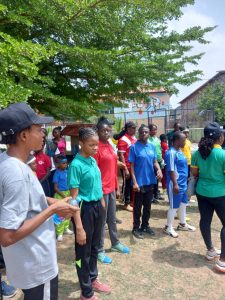As the world marks the 2023 World Down Syndrome Day, many parents are encumbered with how to tackle the challenges of children with special needs.
According the United Nations (UN) estimates that globally the incidence of Down syndrome is between 1 in 1,000 to 1 in 1,100 live births worldwide
A UN report furthers says that yearly, approximately 3,000 to 5,000 children are born with this chromosome disorder.
It is against this background that in December 2011, the UN General Assembly declared that with effect from March 21 it will mark the World Down Syndrome Day.
The aim is to raise public awareness of Down syndrome and galvanise international organisations, governments and the civil society to address the challenges of those suffering from the syndrome.
The joy of every parent is to see his/her child compete favorably with other children either in school, sporting activities or any other activities that could make them feel fulfilled.
Teachers on the other hand derive satisfaction in putting in their best to ensure they do not only meet the expectations of parents but also bring out the best in the child.
Teachers unlike parents are usually saddled with the responsibility of seeing the needs of children and being able to tackle such pronto.
This is why children with special challenges or children with special needs are often at the receiving end of parents getting to understand their plight and the appropriate measure to address such need.
Children with such special needs include; Down syndrome, Autism, Cerebral palsy and learning disability which are categorised as neuro-divergent children, while the non-challenged are neuro-typical children.
The confusion of where to place these children with such challenges is often a recurring decimal among parents, who lack the requisite sensitivity to understand how to address such needs with the necessary school environment.
Mr Philip Akpa, Chairman, Parents Teachers Progressive Forum, Safehost International Academic, Kurudu, Abuja said some proprietresses have taken up such challenges of creating the right environment to meet the social and educational needs of such children.
He said instead of locking up their children with special needs in rooms, parents should find the appropriate place that could help confront such challenges develop mentally and academically.
Akpa, said Safehost International Academy is one of the schools addressing the need by providing the right atmosphere for the children to compete with other children in the conventional school.
He said the proprietress thought it wise to have a school where children with neuro-divergent children’s needs could particularly melt.
According to him, the children are taught according to their needs, adding that the idea was to encourage inclusiveness, including the deaf and dumb and other disabilities.
“There are courses for you, there are sign languages that they teach them there and other languages they communicate with these children and they understand”, he said.
He enjoined parents to always ensure that experts handled their wards with special needs.
Ngozi Belolisa, Executive Director of the school, the society should embrace advocacy and inclusiveness for children with special needs.
“Advocacy is talking about what the typical children can do and what the divergent children can do vis-a-vis with their strength and what they can handle”, she said.
Some of the school had always encouraged the students to take sports as they help to develop their mental abilities.
“The synchronisation of sporting activities in the school is actually deliberate, this is to help them to retain, as they are learning they are looking”, Belolisa said.
Mrs Biboara Yinkere, Convener of the Engraced Ones, an NGO, that caters for children with special needs said with the right education and parenting, such children could become productive members of the society.
Yinkere, who is also the Director of School of Grace, a special needs school and the Gracelane Miracle Inclusive School, also in Kurudu, said she disability should not be seen as an encumbrance to productivity.
“People with disabilities can thrive, we know of the Paralympians in Nigeria that are doing very well. Here, the neuro-typical children are brought together in a bid to help strengthen their resolve.
“We also bring them together to foster friendship, to break down the wall of discrimination and segregation”, she said.
The Federal Government said it is aware of the plight of children with special needs and will do everything it can to help them develop into citizens that will contribute their quota to the development of the country.
“Now more than ever, we need to come together to support each other, and remember our most vulnerable populations”, Malam Muhammad Musa the minister of Federal Capital Territory, FCT said.
He spoke during a visit to Brain Bloom Centre, Abuja which is dedicated to the care of children with special needs.
As the world once again marks this year’s edition of the day of down syndrome, experts urge the authorities and every stakeholder to match words with action and fast-track efforts towards making life more enjoyable and meaning for children with special needs.



